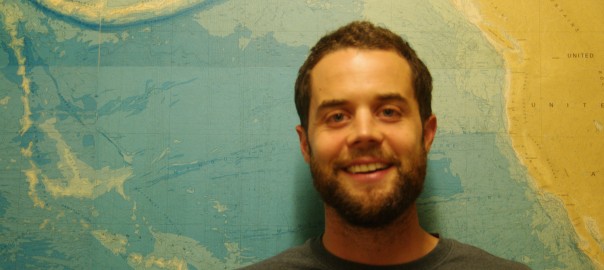A warm welcome to incoming postdoc Dr Greg Britten who joins the MIT Darwin Project as part of the Simons Foundation Collaboration on Computational Modeling of the Biogeochemistry of Marine Ecosystems.
by Helen Hill for CBIOMES
With his primary interest in how ecosystems work, their structure, function, and how they respond to changes in the physical environment, Greg Britten wants to know how organisms have evolved to use and allocate resources from the environment, how changes in the environment can alter the flow of energy through ecosystems, and how that energy eventually makes its way into the fish and other organisms we, as humans, like to eat.
Britten joins MIT’s CBIOMES team which is working on models of marine microbial biogeography and biogeochemistry, with a focus on developing mathematical and computer models of marine plankton ecology. “In particular, we hope to combine computer simulations, observational data sets, and statistical analyses to better understand how species of plankton occupy different environmental niches throughout the ocean, from the tropics to the poles, and how those niches may change with our changing climate,” he says. “In turn, we hope to better understand how changes in plankton ecology may impact the global cycles of carbon, nutrients, and oxygen.”
Britten comes to MIT having recently completed his PhD in earth system science and oceanography with Francois Primeau at the University of California, Irvine, where he studied the cycling of carbon and nutrients in the ocean. “My focus was on how organic matter is transported from the sunlit surface ocean to deep water and how those processes sequester carbon and control the distribution of dissolved oxygen,” he explains. Before his PhD, Britten completed a BSc in statistics and an MSc in biology at Dalhousie University in his hometown of Halifax, Canada. He says he wrote his MSc thesis on the population biology of marine fisheries, working with Boris Worm and Mike Dowd on quantifying large scale trends in the productivity of global fish stocks.
Britten suspects growing up in Nova Scotia where “the ocean is all around you,” undoubtedly helped push him toward oceanography. He explains, “In university I became fascinated with the science and management of fisheries, no doubt influenced by the tragic history of industrial fishing on the Canadian east coast that impacted many friends and family. While studying fisheries I become increasingly interested in the underlying oceanography and how climate impacts the ocean, and how those impacts make their way through marine ecosystems. My hope is that I can now combine my understanding of fisheries and oceanography to help us better manage our wonderful global marine resources.”
Story image: Greg Britten confesses his two favorite things in the world are beer and sunshine. In his spare time he says he likes to hike, play baseball, basketball, grow vegetables, and swim in the ocean. He also admits to having a HUGE soft spot for dogs – Photo credit: Helen Hill
